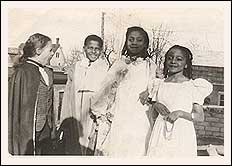
An Interview with
Kathryn Coram Gagnon
Excerpt from: Voices of Rondo: Oral Histories of Saint Paul’s Historic Black Community
Syren Books, September 2005
Part III - Hallie Q. Brown Community Center
Hallie Q. Brown was part of my family’s life. My mother worked there, I worked there, and later was chairperson of the board of directors. Because my mother worked at Hallie at the very beginning, I was there a lot and exposed to many things earlier than some of the children. We had an exceptional opportunity, both with Hallie and St. Philip’s. One of those things that was at Hallie was the Forum Council. Folks like A. Philip Randolph, Thurgood Marshall, and Judge William Hastie at one time governor of the Virgin Islands, amazing people, who spoke to those gathered at the Forum Council session at Hallie.
From the beginning, 1929, Hallie had a history of being involved with music. People like the late Deputy Chief Jimmy Griffin’s brother, Billy Griffin. Mother used to constantly extol Billy. Billy was so clever and he was so brilliant and was such a genius and he did choreography and directed shows and he did musicals and he designed the costumes. Actually, for a while I used to get sick and tired of hearing about Billy, but it’s true that from early on the interesting music in the community had a place where it could reside and that was Hallie.
| Oral Historian |
| Oral Histories |
| Examples of Family Projects |
| Examples of Community Projects |
| Examples of Organization Projects |
| What people are saying about us |
| Contact us |
|
HAND in HAND Productions |
 And one person after another who came in there and taught us. John Whitaker was one of the big names. He did The Frog Prince with kids. And I think we were around ten to twelve years old at that time. It was my first appearance in an operetta was as The Frog Prince. I played the king! I don’t remember much about what I had to do, but I remember one of dear friends who was one of the Eight Debs could not sing. She still can’t sing. She couldn’t carry a tune. And she really didn’t have that much sense of rhythm. So this was her little phrase that she was supposed to sing: [sings] “Bonjour, mon amie from lovely France to thee. See me dress all dainty. It came from gay Paree. France has made the fashions for all the world to see. Bonjour, mon amie from lovely France to thee.” Now that’s what her song was. Here’s how she did it, since she couldn’t sing it. They were going to just play behind her? She went, “bonjourmonameefromlovelyFrancetotheeseemydressall-dainty...”
And one person after another who came in there and taught us. John Whitaker was one of the big names. He did The Frog Prince with kids. And I think we were around ten to twelve years old at that time. It was my first appearance in an operetta was as The Frog Prince. I played the king! I don’t remember much about what I had to do, but I remember one of dear friends who was one of the Eight Debs could not sing. She still can’t sing. She couldn’t carry a tune. And she really didn’t have that much sense of rhythm. So this was her little phrase that she was supposed to sing: [sings] “Bonjour, mon amie from lovely France to thee. See me dress all dainty. It came from gay Paree. France has made the fashions for all the world to see. Bonjour, mon amie from lovely France to thee.” Now that’s what her song was. Here’s how she did it, since she couldn’t sing it. They were going to just play behind her? She went, “bonjourmonameefromlovelyFrancetotheeseemydressall-dainty...”
That’s how she did it! I like to kid her about it still today, but it was hysterical. That was my first really big experience, and John worked with us, had us singing in choruses all the time. In terms of perpetuating music there he has several choral groups going on. Many of his groups were young adults, eighteen to twenty-five, something like that. It was a variety, a wide variety of music from traditional choral music to classical that he did with us. He was really quite an inspiration there at Hallie.
One more thing John Whitaker did when he was at Hallie, he had what they call Sunday Evening Salon. This was an effort to provide us with some culture, okay, but he had people—Marian Anderson never came to sing there, but he had people like that come, and you learned how to sit in a chair. I mean, this would be people of all ages, little kids. I had to go because my mother worked there and I loved it. But you learn to sit still until intermission or until the end of the program, to listen, to be at least moderately appreciative, and applaud. The Sunday Evening Salons were wonderful.
Next: < Part IV - The Eight "Debs" >
< Return to Part I - Kathryn's Introduction Page >
© 2024 HAND in HAND Productions